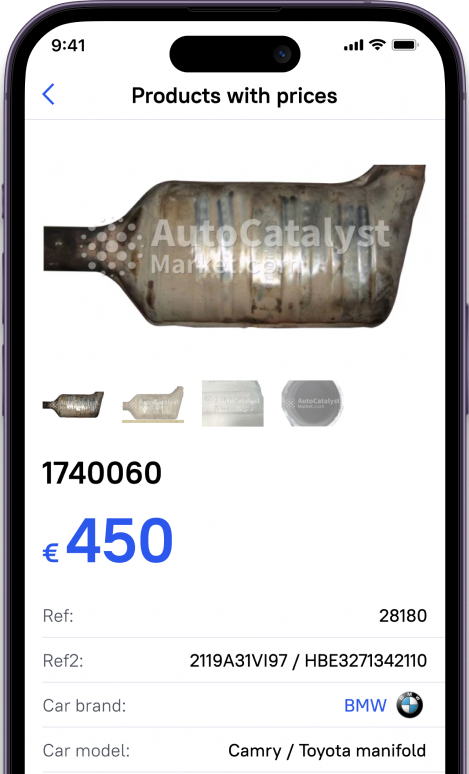- How the catalytic converter works
- What does a catalytic converter consist of?
- Types of catalytic converters
- Bilateral
- Three way catalytic converter
- Ceramic
- Metal
- Sports catalytic converters
- What happens to a catalysts with time?
Catalytic converters began to be installed in order to reduce the harmful effects on environment of exhaust gases that are generated during the operation. However, not all drivers approve installation of catalysts, because the cost of this unit is quite high. In addition, due to low quality of gas, it is necessary to repair catalytic converters regularly. Specialized companies purchase used catalysts offering good money bonus.
How the catalytic converter works
Catalytic converter is one of components of exhaust system. Why is there a catalyst in a car? Catalytic converter helps to reduce the percentage of harmful substances in exhaust fumes. These include carbon monoxide, nitrogen oxides and hydrocarbons.
Today, vehicles are equipped with catalysts, which are made of noble metals. When the engine is running, exhaust gas heat up the catalytic converter. Temperature of catalyst becomes quite high. As a result, noble metals burn out harmful substances, percentage of which decreases.
What does a catalytic converter consist of?
From the case with a base in form of ceramic or metal honeycombs. It is coated with a platinum-iridium alloy coating. Due to honeycomb structure, contact area of exhaust gas and surface of catalytic converter layer increases. An oxidizing reaction of carbon monoxide and hydrocarbon proceeds in a catalyst. As a result, relatively harmless substances nitrogen and carbon dioxide come out of exhaust pipe.
Vehicle can run without a catalytic converter, but experts recommend mounting it when:
-
Car age up to 5 years;
-
Auto inspection is coming;
-
Planning a trip abroad;
-
Make exhaust less harmful to environment.
Types of catalytic converters.
All exhaust system catalysts are divided into the following types:
Bilateral
Carbon monoxide is oxidized to carbon dioxide, as well as fuel that has not burned or burned out, to water and carbon dioxide due to the combustion reaction. Typically, these two-way catalytic converters are installed on cars with diesel engines.
Three way catalytic converter
Such a catalyst was developed back in 1981. Its main goal is to reduce the amount of harmful substances that enter the environment. The trilateral type catalytic converter solves several problems. For example, it oxidizes carbon monoxide into carbon dioxide, as well as hydrocarbons that are not burnt, into water and carbon dioxide. It is also able to convert nitric oxide to oxygen and nitrogen.
Catalysts are divided into types depending on material of the cartridge. These types are distinguished:
Ceramic
A design resembling a honeycomb is installed. Neutralizing element made of ceramic is protected by a platinum-iridium alloy. What are disadvantages of a ceramic unit? Many car owners believe that such a device is too fragile. For example, honeycomb will deteriorate if a catalytic converter hits during riding. In addition, if you drive through a puddle in a warmed-up car, water droplets will fall onto a red-hot catalytic converter, and it will become worthless. Ceramic dust accumulates inside the device. It penetrates not only the combustion chamber, but sometimes into the cylinders of the engine. The main advantage of a catalysts made of ceramic is its cost.
Metal
The design of such catalytic converters is quite strong and reliable. Metal catalyst is not afraid of mechanical stress. Made from metal, the shape of a spiral resembling a honeycomb is more elastic. But even such a reliable metal unit has its drawbacks:
-
Dot use low quality or leaded fuel.
-
Oils and antifreeze can enter the combustion chamber.
-
Technical fluids may only be used to flush systems from a reliable manufacturer.
-
Re-enriched fuel mixture may cause damage.
-
Continuous idling of engine can also lead to malfunction.
Sports catalytic converters
These are metal products with increased throughput compared to conventional metal or ceramic catalysts. Sports catalysts make a car 7–20% more powerful, of course, if a direct-flow exhaust system is mounted on vehicle. Sports catalysts comply with the environmental requirements of Euro 4 and 5. Such models have increased reliability. However, if you intend to purchase such a catalytic converter for a car, the price will be quite high.
What happens to a catalysts with time?
Companies claim that they can be used for 100,000-150,000 kilometers. However, in reality, this unit can fail much earlier, especially if you live in a metropolis and constantly stay in traffic jams.
Why may catalytic converter become unusable? The fact is that the vehicle’s catalyst device is a filter. And the filter needs to be changed regularly.
The life of term of a catalytic converter will become shorter if ignition system is malfunctioning. If ignition is set incorrectly, misfires will occur. As a result, the fuel mixture burns only partially. A huge amount of soot is formed, which accumulates in a catalytic converter. The best solution is to clean it. But this will not help if honeycombs are melted. You can always sell old catalytic converter obtaining substantial price.
Among common causes of catalyst malfunction is damage. If catalytic converter has to deal with low quality fuel, It will not completely burn out. Afterburning process will occur in collector and directly in catalytic converter. The microparticles clog the filter and air cannot pass through it.
Pay attention to the quality of driving and keep contacts of reliable catalyst recycling companies in your phone contacts.



































